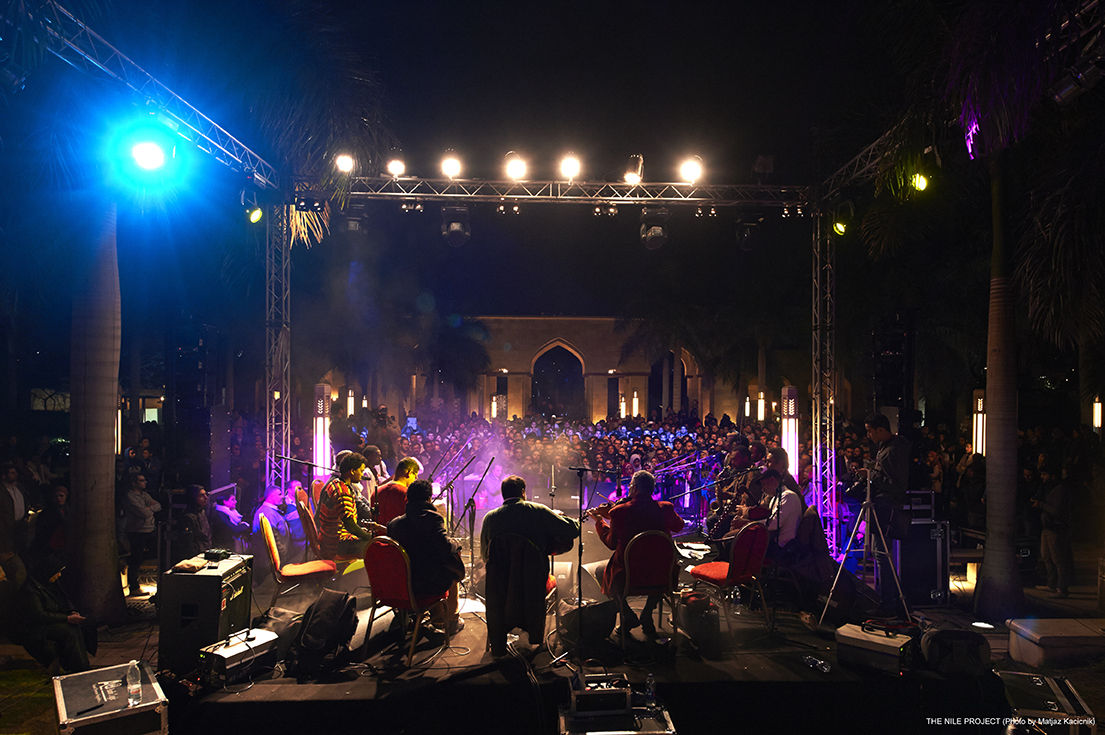
Nile Project concert in Al Azhar Park, Cairo, Egypt on January 31, 2013.
Music will transcend boundaries Sunday in an effort to raise awareness of the cultural and environmental issues surrounding the Nile River basin on a colorful stage populated with instruments as diverse as the people playing them.
The Nile Project, a concert with a humanitarian mission, is running at the Clarice Smith Performing Arts Center this weekend. As a part of The Clarice’s Artist Partner Program, the project aims to inspire action, said Mina Girgis, the project’s co-founder and executive director, who started the project after seeing an opportunity to unite the diplomatically fractured countries that share the Nile basin.
Girgis, an ethnomusicologist and hospitality professional, engaged in similar initiatives prior to working with The Nile Project, in which he used music as a way to explore cultures that crossed countries and even continents. The Egypt native first decided to apply this exploratory model to his East African home when he was at an Ethiopian concert in Oakland, California.
“That’s where the dots connected,” he said. “I realized that … I’d never been exposed to Ethiopian music, even though Ethiopia is a Nile neighbor. There’s a lot of cultural isolation among the countries sharing this river.”
The Nile basin extends more than 1 million square miles and through 11 countries, nine of which are among the least-developed countries in the world, according to the United Nations. The river is the longest in the world, yet moves only a fraction of the water flowing in the Amazon River, Girgis said.
This leads to competition among border nations that need the scarce water supply to grow their crops and fuel their industries. Downstream countries suffer if upstream countries build up infrastructure that impedes the Nile’s already shallow discharge, Girgis explained. The Nile Project works to remedy the burgeoning lack of trust among these geographically united nations.
“We all either solve our problems together, or we all fail together,” he said. “Engendering that sense of community, engendering that sense of one region, is something that you don’t do with legal treaties. It’s something you do with more cultural diplomacy.”
Girgis and Nile Project co-founder Meklit Hadero started their collaboration in 2011 and have since gathered musicians from all 11 Nile basin countries into intensive residencies. The artists come from different backgrounds and speak different languages, but together, they compose music that combines these differences into a rich, musical tapestry.
“The Nile Project is all about management from the bottom up,” said Jen Shaffer, an anthropology professor at this university. “The national level might not be talking to each other, but at the local level, they have to.”
The Nile Project’s main objective in campus communities is to create grassroots inspiration. It is as much an educational initiative as a musical one, focusing its work on universities, Girgis said.
“What we are hoping to do is use this music to mobilize students to build this network across many universities in both the U.S. and Africa to engage in dialogue,” he said. “That would allow them to better understand realities of these communities sharing the river and come up with out-of-the-box and creative solutions to these challenges.”
The project involves educational outreach through an innovation competition and a fellowship program. This year’s competition, Nile Prize, will focus on sustainability. The Nile Fellowship, a student leadership program, will identify 20 student leaders from African university campuses to better understand the Nile conflict and begin to form the network.
“The music really acts as an inspiration,” he said. “Once you’re inspired you ask questions. If you can’t find answers to those questions, you’re stifled.”
To answer those questions, Girgis and collaborators have organized a series of university activities that allow students and faculty to transition from the abstract concert to an intellectual experience.
A series of discussions will follow Sunday’s concert. The panels will feature both musicians and academic experts with concrete ideas and solutions for the multifaceted problems that envelop the Nile community.
One conversation, “Female Perspectives on the Nile,” will address specifically the almost indomitable patriarchy that bars women from water-related negotiations, among other things, though they have the most intimate relationship with stewarding the river, said Chloe Schwenke, a public policy professor at Georgetown University.
“Right now, women have no say in how the Nile is managed,” she said. “Hopefully the sounds and songs of the musicians will establish some of the values of respect for that river.
“Getting people to be on the same page in terms of being in a conversation about why stewardship of the Nile is important is challenging in any sense, but music is a possibility. Music opens a door here. It helps transcend ethnic divisions.”
The Nile Project runs on Sunday at The Clarice. Check theclarice.umd.edu for more information about the Monday and Tuesday discussions in conjunction with the concert.



